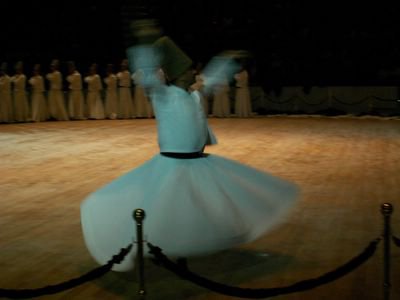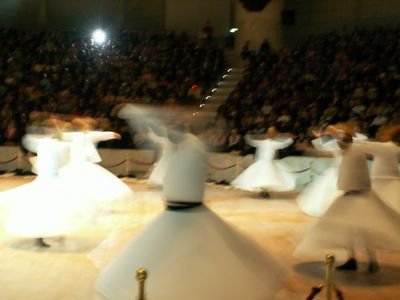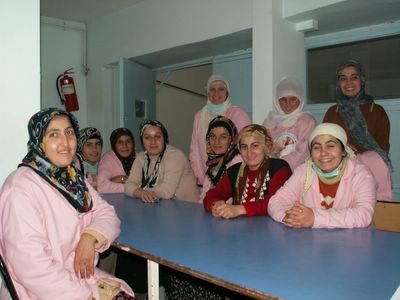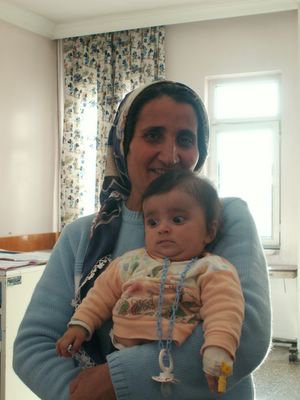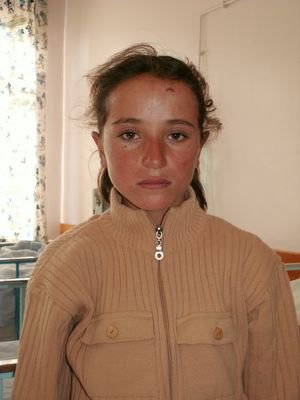Tuesday, December 13, 2005
Went to Konya to see the annual performance of the Whirling Dervishes. The Whirling Dervishes are a religious group called the "Sufis." They twirl as a ritual dance representing union with god. While twirling, the right hand faces up to the heavens, and the left faces down to ground them to the earth. They only perform for religious reasons during two weeks in December in Konya.
Friday, December 09, 2005
VAN
I had a great trip with my friends Sharon and Iris. Sharon won a grant to film a documentary about women's issues in Turkey. We went east for a few days to the town of Van (just a few miles from the border with Iran) to explore this issue. Sharon sent some e-mails ahead of time but didn't get any responses. On our way there she expressed that this trip might not be fruit-full but maybe she can get some "B footage" (that's film talk for background footage). She did have the phone number for a doctor in Van who was a friend-of-a-friend. When we arrived she called him. 30 minutes later Dr Kirim picked us up. He spent more than two days with us, taking us around to meet women's groups, taking us to his hospital to talk with women, and translating for us. The trip exceeded any expectations!!
We spoke with two different women's groups. The first group was an "all fired up, with sparks in their eyes, feminists who are ready to take on the world." The women we interviewed was a real pistol. I think Sharon asked one opening question and three hours later she paused.
The second day we spoke to a very different women’s group. These women wore head scarves and made it very clean that they were not ‘feminists.’ They were religious women and worked for women’s issues through Islam. Unfortunately I didn't get any pictures of them because I was busy working as Sharon's camera man.
Many times in our conversations with them, the topic of “head scarves” came up. (Background – Turkey is trying to become, and/or portray itself as, a more secular country. Some years ago they made it against the law to wear a headscarf in universities, official functions, in public buildings etc.) They told us several stories about how they couldn’t take a job they wanted because it was a government job and they couldn’t wear a headscarf, or they couldn’t go to the university, or couldn’t attend a function, and on, and on. Before we left their office, they invited us to their house for dinner……..and of course we could not refuse.
It was a great cultural experience to have dinner with a real Muslim Turkish Family. At dinner there were only women there but many women (friends, aunts, grandmothers, cousins, etc, and a translator). Dinner was short, and not everyone ate with us in the dinning room (most people ate in the kitchen). After dinner tea, fruits, nuts, and discussions could have gone on all night! Mostly they told us about Islam and their troubles in Turkey (including the headscarves). What is the difference between very Islamic people and very Christian people? As far as I can tell – not much. They reminded me of people in Oklahoma that feel very passionately about religion.
Dr Kirimi also took us to his hospital to talk to some of the women on his floor. He is Chief of Neonatology. We had wonderful discussions with all the women (mostly Kurdish) who were staying with a sick baby in the hospital. I can’t type all the wonderful details of the discussions but hopefully we can all watch them on Sharon’s Documentary in a few months.
On our final day in Van, we found time for some sight seeing. We went to Van Lake and toured the Van Castle.
We spoke with two different women's groups. The first group was an "all fired up, with sparks in their eyes, feminists who are ready to take on the world." The women we interviewed was a real pistol. I think Sharon asked one opening question and three hours later she paused.
The second day we spoke to a very different women’s group. These women wore head scarves and made it very clean that they were not ‘feminists.’ They were religious women and worked for women’s issues through Islam. Unfortunately I didn't get any pictures of them because I was busy working as Sharon's camera man.
Many times in our conversations with them, the topic of “head scarves” came up. (Background – Turkey is trying to become, and/or portray itself as, a more secular country. Some years ago they made it against the law to wear a headscarf in universities, official functions, in public buildings etc.) They told us several stories about how they couldn’t take a job they wanted because it was a government job and they couldn’t wear a headscarf, or they couldn’t go to the university, or couldn’t attend a function, and on, and on. Before we left their office, they invited us to their house for dinner……..and of course we could not refuse.
It was a great cultural experience to have dinner with a real Muslim Turkish Family. At dinner there were only women there but many women (friends, aunts, grandmothers, cousins, etc, and a translator). Dinner was short, and not everyone ate with us in the dinning room (most people ate in the kitchen). After dinner tea, fruits, nuts, and discussions could have gone on all night! Mostly they told us about Islam and their troubles in Turkey (including the headscarves). What is the difference between very Islamic people and very Christian people? As far as I can tell – not much. They reminded me of people in Oklahoma that feel very passionately about religion.
Dr Kirimi also took us to his hospital to talk to some of the women on his floor. He is Chief of Neonatology. We had wonderful discussions with all the women (mostly Kurdish) who were staying with a sick baby in the hospital. I can’t type all the wonderful details of the discussions but hopefully we can all watch them on Sharon’s Documentary in a few months.
On our final day in Van, we found time for some sight seeing. We went to Van Lake and toured the Van Castle.
